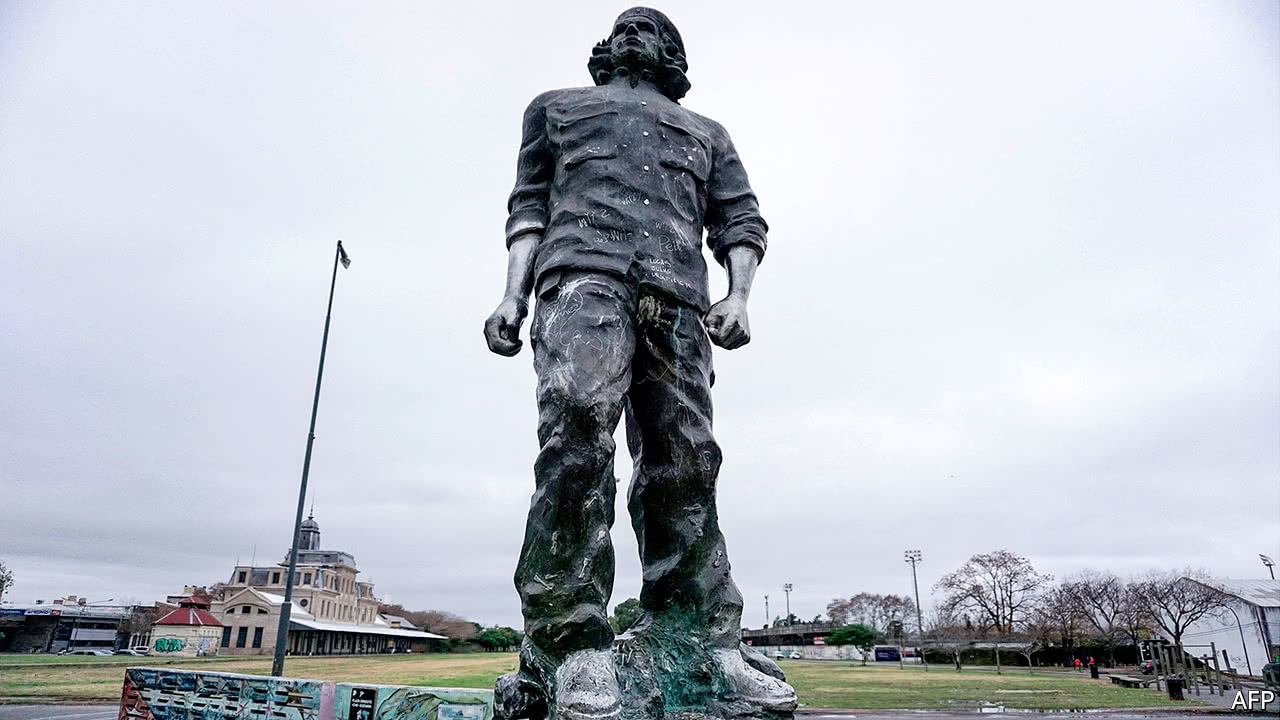Challenging the cult of Che Guevara
A liberal think-tank in his home town wants monuments to the revolutionary icon taken down
CHE GUEVARA was born in Rosario, then Argentina’s second-largest city, in 1928 but did not stay long. Less than a year later his family moved away. Yet his birthplace has not forgotten the left’s warrior-saint. A red banner marks the posh apartment block where he was born. A four-metre-high (13-foot) bronze statue stands in Che Guevara Square. The city council finances CELChe, a centre devoted to the study of his life, and celebrates “Che week” around his birthday in June. CELChe will stage a concert to commemorate the 50th anniversary of his death on October 9th.
Not everyone in Rosario thinks the bereted revolutionary, who was captured by soldiers in Bolivia and killed on the orders of the country’s pro-American dictator, deserves such reverence. Fundación Bases, a liberal think-tank based in the city, has launched a petition to persuade the city council to remove the monuments. The martyr was himself a killer, says Franco Martín López, the institute’s director. Guevara was second-in-command to Fidel Castro, whose Cuban revolution killed more than 10,000 people. “No one here has any idea about the massacres committed during the revolution,” Mr López laments.
Under the motto “a murderer doesn’t deserve state tributes”, Mr López’s foundation has produced videos to educate Argentines, and rosarinos in particular. One shows a clip of Guevara promising to “continue the firing squads for as long as necessary” in a speech to the UN General Assembly in 1964. In another, a narrator reads out the accusatory suicide note of Reinaldo Arenas, a gay novelist who died in 1990 after suffering decades of persecution by Cuba’s government. Mr López is looking for a sympathetic councillor to present the petition on the anniversary of Guevara’s death. More than 3,000 people have signed it since its launch on May 2nd.
It is unlikely to persuade the council, which has been controlled by the Socialist Party since 1989. Norberto Galiotti, the cigar-smoking secretary of Rosario’s Communist Party, regards the foundation’s campaign as a part of a pernicious effort to erase Che from history, led by the country’s centre-right president, Mauricio Macri. After he took office in 2015 he removed a portrait of Che hung in the presidential palace by his populist predecessor, Cristina Fernández de Kirchner. Mr Galiotti suspects liberals are envious of Che’s posthumous charisma. “You don’t see many kids walking around with Margaret Thatcher T-shirts,” he observes.
Mr López does not expect the monuments to come down. “The real objective is to raise awareness of the issue and start a debate,” he says. But some of Che’s fans are not interested in dialogue. Fundación Bases dropped plans to show the videos on screens in Rosario because the advertising firm that operated them was “worried people would smash them”, says Mr López. Che would have been pleased.
Not everyone in Rosario thinks the bereted revolutionary, who was captured by soldiers in Bolivia and killed on the orders of the country’s pro-American dictator, deserves such reverence. Fundación Bases, a liberal think-tank based in the city, has launched a petition to persuade the city council to remove the monuments. The martyr was himself a killer, says Franco Martín López, the institute’s director. Guevara was second-in-command to Fidel Castro, whose Cuban revolution killed more than 10,000 people. “No one here has any idea about the massacres committed during the revolution,” Mr López laments.
Latest updates
It is unlikely to persuade the council, which has been controlled by the Socialist Party since 1989. Norberto Galiotti, the cigar-smoking secretary of Rosario’s Communist Party, regards the foundation’s campaign as a part of a pernicious effort to erase Che from history, led by the country’s centre-right president, Mauricio Macri. After he took office in 2015 he removed a portrait of Che hung in the presidential palace by his populist predecessor, Cristina Fernández de Kirchner. Mr Galiotti suspects liberals are envious of Che’s posthumous charisma. “You don’t see many kids walking around with Margaret Thatcher T-shirts,” he observes.
Mr López does not expect the monuments to come down. “The real objective is to raise awareness of the issue and start a debate,” he says. But some of Che’s fans are not interested in dialogue. Fundación Bases dropped plans to show the videos on screens in Rosario because the advertising firm that operated them was “worried people would smash them”, says Mr López. Che would have been pleased.

No comments:
Post a Comment